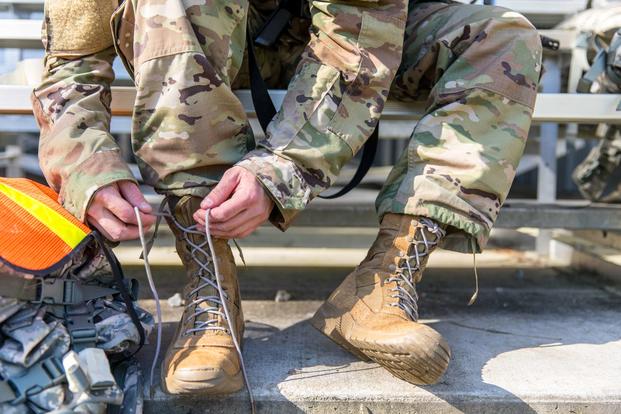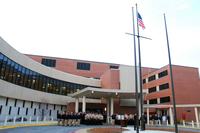Before I met and married my husband, a Marine Corps reservist currently with 10 years in the service, I had no real understanding about military Reserve life. In fact, I had no comprehension at all. It felt like I spent the first year I dated my husband simply trying to learn the lingo that is Military Acronym Speak, let alone having to have him explain every nuance of reservist life.
I’ve since gotten the hang of things. But I know there are plenty of people out there who don’t understand how life in the Reserves differs from life in the Active Duty. I’m going to share with you what I think are the nine most common myths about being a Reserve family.
9 Myths About Military Reserve Life
Myth 1: Because we are a “military family,” we have access to Tricare health benefits.
Truth: Sort of. Yes, we can get Tricare, but only if my husband is activated for more than 30 days. Outside of his deployments, that kind of activation has only happened once since I’ve known him. He was activated for 31 days and sent to Australia to train. Other than those rare occasions, we are only able to use Tricare if we pay extra for it, which is usually more expensive than simply buying our own insurance or paying for benefits through one of our civilian jobs.
Myth 2: We get military allotments like uniform allowance, Basic Allowance for Housing (BAH).
Truth: Nope. The only time we qualified for BAH was when my husband deployed. And we do not get uniform allowances, though my husband is required to keep his uniform tailored and up to date just like his active duty counterparts. This means that uniform expenses and the likes are out of pocket for us. But we can claim it on our taxes, along with his travel expenses associated with drill weekends and many other things.
Myth 3: Because we’re Reserve and have a “normal” civilian life, we don’t really miss the fun parts of active duty life.
Truth: I have never gotten to see my husband get pinned after a promotion. If I even know about the event ahead of time or am invited to it, I live too far away from where it is held to easily attend. I will always be sad that I miss out on these types of special events in his career. Yes, I have civilian job-related events to be proud of him for, but I’m pretty sure there is nothing quite like the pride of watching your spouse get pinned … but I will never get to know for sure.
Myth 4: When my husband goes to drill we get extra Reserve and Guard pay benefits.
Truth: This might be the most common myth that I have to dispel for both my civilian and Active Duty friends. Benefits only change when my husband gets activated/deployed. That means regardless of whether he is at drill or serving his two weeks a year, our benefits never change. By the way, the military pay calculator is helpful for figuring out those benefits.
Myth 5: We have access to all the same help in times of need as our Active Duty friends.
Truth: Although we can use Military OneSource, most non-profits and other such organizations that are in place to help the military are actually only for Active Duty families. The idea behind that restriction is that Reserve families have civilian jobs to fall back on.
But it means that when my husband misses work for his military service, but the military doesn’t pay us right away, neither the civilian world nor Military OneSource offers us aid to help get us over that financial hump, both perhaps assuming that the other will step-up. It also means that in times of emergency both groups often take the same attitude.
This also includes financial scholarships for schooling and just about anything else you can think of. Most groups are for Active Duty families only, though they don’t often advertise this fact.
Myth 6: Because we’re Reserve, my husband never misses important family events like birthdays and anniversaries.
Truth: My husband nearly always misses important events like my birthday. We didn’t get to spend a real anniversary together until our third year of marriage and he misses nearly all major family events. He has met most of my family only once, at our wedding. Reserve or not, the military simply doesn’t care what weekend they have drill, or other military related service, nor do they care if they deploy your spouse five months into your marriage. We’re in the same boat on this one: my husband misses nearly all the same major life events as Active Duty service members do.
Myth 7: Reservists never (or rarely) deploy.
Truth: This myth is starting to die on its own, but has been held onto by much of the civilian world. My family, for example, was not only shocked to find out that I was dating a Reservist who is a veteran of the Iraq war, but I thought their jaws were going to hit their knees when I told them he was going to face deployment again.
Myth 8: Reservists aren’t as proud of military service as Active Duty folks. If they were, they’d have joined the Active Duty force.
Truth: This might be the most hurtful of all the myths about Reservists and their families. The truth is that everyone chooses what is right for them. My husband serves his country proudly, and I am equally as proud of his service as any Active Duty spouse is of their service member. I would have no problem with him deciding to go active duty, but l leave that up to him, since he’s the service member. His choice to go Reserve has nothing to do with a lack of pride in his military service or record.
Myth 9: Reserve families have it easier than Active Duty families because they split time between the civilian and military worlds.
Truth: I honestly don’t think one has it any easier than the other. Each side has a unique set of challenges that they face. Some of those challenges overlap and some are specific to being Reserve or Active Duty. I don’t deal with PCS moves, and having never PCSed, but being a person who does not take moving well, I can only imagine it’s exciting but very difficult emotionally.
On the flip side, when my husband deployed, I was miles away from the nearest base and hours away from the nearest spouse from my husband’s unit. It means that we reserve spouses often feel alone during deployment because it’s unlikely we are near a base or other families to help us cope. There is always going to be something I can look at and say, “I don’t know how I would cope with that.”But the same goes for everyone in life, regardless of whether you are a civilian, Reservist or Active Duty family.
Are you are Reservist? What other reservist life myths would you add to this list? Active Duty? What about the above surprised you? Share below and check out these Guard and Reserve frequently asked questions.
Keep Up with the Ins and Outs of Military Life
For the latest military news and tips on military family benefits and more, sign up for a free Military.com membership and have the information you need delivered directly to your inbox.









